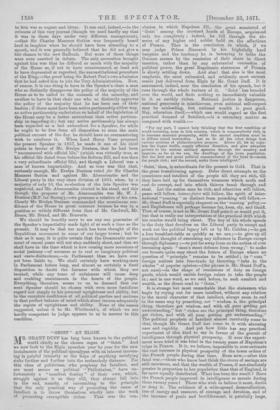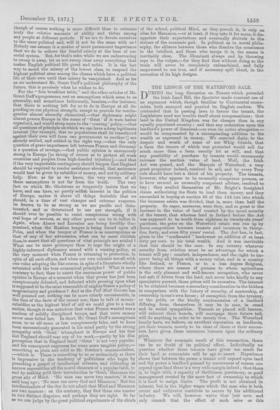" GEIST " AT ELGIN.
MR. GRANT DUFF has long been known to the political world chiefly as the chosen organ of "Geist." And we now look to the Elgin speeches year by year for the new instalments of the political apocalypse with an interest increas- ing in painful intensity as the hope of anything satisfying sinks further and further into the melancholy distance. For this class of politicians, who prophesy for Intellect, and are most severe on political " Philistinism," have un- fortunately a "manifest destiny" of their own, which, struggle against it as they will, they always fall into in the end, namely, of succumbing to the principle that the only practical way of promoting the cause of Intellect is to throw themselves wholly into the work of promoting corruptible riches. That was the con elusion in which Napoleon III., the groat annointed of Geist ' among the crowned heads of Europe, acquiesced only too completely ; indeed, he fell through the ab- sence of any higher and nobler hold on the affections of France. That is the conclusion in which, if we may judge Prince Bismarck by his frightfully hard bargains and the tendency he is betraying to bribe the German masses by the remission of their share in direct taxation, rather than by any substantial concession of political power, the great Napoleonic statesman of Prussia is slowly settling down. And alas! that also is the most emphatic, the most reiterated, and evidently most earnest oracle just delivered from Elgin by Mr. Grant Duff. It is announced, indeed, near the conclusion of his speech, but it
runs through the whole texture of it. Geist ' has brooded over the world, and finds nothing so immediately valuable in it as earthly riches. National justice is dangerous, national generosity is mischievous, even national self-respect may be misleading, but national wealth is pure good. Nay, education itself,—which one would regard as the first practical demand of Intellect,—is a secondary matter as compared with wealth :—
For my part, I cannot help thinking that the first condition of world-bettering, even in this country, which is comparatively rieh, Is to increase material prosperity, while the second condition must be to diffuse sound instruction. Let us do all the other things that various sections of philanthropists propose. Above all, let us regu- late the liquor traffic, supply efficient direction, and give adequate powers to the various sanitari agencies through the country, and improve, as far as we can, the dwellings of the town population. But the first and great political commandment of the hour is—make the people rich; and the second, make them intelligent."
Geist,' then, is subordinate for the present to Gold. That is the great transforming agency. Defer direct attempts on the conscience and intellect of the people till they are rich, till they have laid up for themselves treasures which moth and rust do corrupt, and into which thieves break through and steal. Let the nation once be rich, and education will follow., peace will follow, laissez7faire will follow, the spirit of inter- national " coaxing " as distinct from preaching will follow,— Mr. Grant Duff is especially eloquent on the ' coaxing ' policy,— and Englishmen will perhaps become fat, keen, sly, and timid. That, of course, is not as Mr. Grant Duff puts it or would put it, but that is really our interpretation of the practical drift which his oracles would bring about. The key of his whole speech is the duty that devolves on the Liberal party to accept and work out the political legacy left us by Mr. Cobden ;—to get a free breakfast-table as quickly as we can ;—to give up all practical thought of exercising any influence in Europe except through diplomacy ;—to put far away from us the notion of ever becoming again "man's stout defence from wrong ;" to make our breasts quits easy about the future of Europe where no question of " principle " remains to be settled ; to " coax " foreign nations into free-trade by throwing "tubs to the whales " of popular opinion—(the phrase is Mr, Grant Duff's, not ours)—in the shape of remissions of duty on foreign goods, which would enable foreign rulers to take the people in ; and in one word, as we said before, to seek comfort and wealth, as the direct road to " Geist."
It is strange but most remarkable that the statesmen who begin by crying out for more intellect, without any relation to the moral character of that intellect, always seem to end in the same way by preaching, not " wisdom is the principal thing, therefore get wisdom, and with all your getting get understanding," but " riches are the principal thing, therefore get riches, and with all your getting get understanding." The political prophets of Intellect almost inevitably come to that, though Mr. Grant Duff has come to it with alarming ease and rapidity. And yet how little has any practical experiment of this kind to say in favour of the genesis of intelligence through physical prosperity. If ever the experi- merit were tried it was tried in the twenty years of Napoleon's reign in France. It is, we believe, impossible to over-estimate the vast increase in physical prosperity of the lower orders of the French people during that time. Even now,—after this fatal war,—those who know best think the stores of savings are still enormous, and that the wealth of France, if not absolutely greater in proportion to her population than that of England, is far more equally distributed. What has been the result ? Have the French people improved in intelligence or morals during these twenty years ? Those who wish to believe it most, doubt or deny it. The evidence of a wide-spread demoralization, loss of energy and resource, of courage and devotion, and of the increase of panic and bewilderment, is painfully large, though of course nothing is more difficult than to estimate truly the relative amounts of ability and virtue among any people at different periods. If we are to devote ourselves to the same political end, will it not be the same with us ? Nobody can esteem it a matter of more paramount importance than we do to relieve the fearful misery at the base of our social system. But, for God's sake, while we are endeavouring to sweep it away, let us not sweep clear away everything that makes English political life great and noble. It is the last way to mend the misery of the lowest class, to suspend the highest political aims among the classes which have a political life of their own until that misery be vanquished. And as far as we understand Mr. Grant Duff's political philosophy of the future, this is precisely what he wishes to do.
For the " free breakfast table," and the other articles of Mr. Grant Duff's programme, rest on assumptions which seem to us generally, and sometimes ludicrously, baseless,—for instance, that there is nothing left for us to do in Europe at all de- pending on our physical strength, except to provide for contin- gencies almost absurdly chimerical,—that diplomacy might almost govern Europe in the name of Geist ' if it were better organized, and would stoop more to the coaxing' policy,—that all questions of principle on which we can have a deep legitimate interest [for example, that no populations shall be transferred against their own will from one government to another 1] are already settled, and settled in the right way,—that the only question of grave importance left between France and Germany is a question of revenge,—that public opinion is enormously strong in Europe [so strong of course as to protect all weak countries and peoples from high-handed injustice],--and that if the very improbable contingency should happen that England should be required to render assistance abroad, that assistance would best be given by subsidies of money, and not by military help. Now, as far as we know, the very reverse of all
these assumptions is not far from the truth. The very fact on which Mr. Gladstone so frequently insists that we have, and can have, no purely selfish interest in the politics of Europe, makes it above all things desirable that we should, in a time of vast changes and extreme suspense, be known to be as strong as we are pacific and disin- terested, and as determined to use our strength, if it should ever be possible to resist conspicuous wrong with real hope of success, as any other power can be to inflict it. Again, when Alsaoe and Lorraine are being forcibly Ger- manized, when the Bullion tongue is being forced upon all Poles, and when the temper of France is as unscrupulous as that of any of her adversaries, what can be more childish than,to assert that all questions of vital principle are settled ? What can be more grotesque than to urge the might of a highly-informed diplomacy armed with a coaxing policy, at the very moment when France is returning to protection, in spite of all such efforts, and when our own colonies are all with one voice adopting the like course, in spite of a literature wholly i saturated with the true economical principles ? What is more contrary to fact, than to assert the enormous power of public opinion in Europe at a moment when that power has just been conspicuously defeated, and defeated while pressing upon what is supposed to be the most reasonable of mighty States a policy of magnanimity and prudence ? And as the Pall Mall Gazette has well pointed out, nothing can be more utterly unreasonable, in the face of the facts of the recent war, than to talk of money- subsidies as the highest kind of aid we could give to a weak nation, though it was notorious that what France wanted was a nucleus of solidly disciplined troops, and that mere money never once failed her. In short, Mr. Grant Duff's assumptions seem to us all more or less conspicuously false, and to have been unconsciously generated in his mind partly by the strong Sympathy with Geist' triumphant in Europe and his fear lest England should mar any of its work,—partly by his dim perception that in England itself Geist' is not very popular, and his consequent eagerness for some more tangible policy,— something as plain and solid as Mr. Cobden's commercialism, —which is. There is something to us as melancholy as there is impressive in the tendency of politicians who begin by preaching a gospel of intellectual solvents, and ridiculing as narrow superstition all the moral elements of a popular faith, to end by making gold their introduction to 'Geist,' Mammon the great ally of Mind. 'No man can serve two masters,' it was said long ago ; No man can serve God and Mammon.' But the intellectualists of the day do not admit that Mind and Mammon are two masters ; on the contrary, they find them one master in two distinct disguises, and perhaps they are right. So far as we can judge by the great political experiments of the chiefs of the school, political Mind, as they preach it, is only an alias for Mammon,—or at least, if they take it for more, it dis- appoints their expectations and eventually shrivels to the stature of the economic god. In political as in moral philo- sophy, the alliance between those who dissolve the conscience in the intellect, and those who merge it in the senses is inevitably close. The illuminati always end by throwing sops to the vulgar,—for they find that without doing so the brain will never be completely enfranchised, and fully empowered to use iron, and if necessary spill blood, in the execution of its high designs.











































 Previous page
Previous page